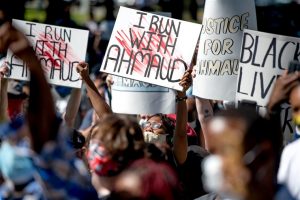Emerging post-conflict Sudan has paid significant price for peace, says the country’s Foreign Affairs Minister, Prof. Ibrahim Ghandour while exchanging views with visiting American journalists.
In the words of Sudan’s top diplomat “… for the price of peace it has been too high to have part of the country to be lost and part of the people created a new country and we continue talking to the rebels including the people of Darfur” as exemplified in the Abuja, Doha, and Addis Ababa rounds of talks.
Ghandour who displayed apparent mastery of his job spoke of the strategic importance of Sudan in the restoration of peace and security in the region and emphasized the shared bond among countries in the horn of Africa.
The quest to strengthen regional cooperation and East African Economic Community is critical to bolster partnerships and economic integration through rail, road, and air transportation to ensure the free movement of persons and products. With famine afflicting neighboring countries, the minister believed that Sudan’s surplus of grains because of good rainy season last year could assist in alleviating food shortages for neighbors in need of food.
He reiterated the government’s policy of constant dialogue with rebels, citing the civil war in South Sudan that predated recent conflicts in the region. prior to the country’s independence. A review of the history of Sudan, says the minister indicates that “during the civil war in South Sudan that started in 1955 before the country’s independence, the government continued talking to the rebels – SPLA rebels until the Comprehensive Peace Agreement – CPA was signed that paved the way for the emergence of a new country.
In acknowledging the nexus between a country’s domestic policy and foreign policy, Professor Ghandour paid tribute to President Omar Bashir for initiating the ongoing national dialogue in the country three years ago.
One the problems of Africa, he noted, is intra and inter -ethnic rivalry as well as inter-state conflicts pointing out that “right now, almost 28 African countries are either in intra or inter-country conflicts”.
Consequently, Sudan embarked on an unprecedented political experiment in her history – the most ambitious participatory government. One of the ways that have been used properly is inclusion and this is why the national dialogue came into existence almost 3 years ago by the decision of the president in 2014 involving 107 political parties and movements talking to each other for almost two years and agreeing on recommendations that ceded 900 accommodations of issues of concern from politics to economy to governance to foreign policy.
Now a new government is to be formed based on those recommendations that “ I think is the largest inclusivity in the history of Sudan and largest government formation in the country”. Some political observers of the unfolding democratic reforms in the East Africa have noted that the extent to which the involvement of all political divides ushers in true democracy with possible emergence of a one-party state remains to be seen.
Other issues related to peace and security is youth unemployment. In Sudan, access to education has improved remarkably. In each of the 18 states, there is a university. Graduates are found in every family. Government cannot employ all the graduates.
However, government is following a policy of helping those young men and women to incorporate their activities into small entrepreneurship in communities in agriculture and small industries. This is a way supporting employment for youths. “Banks have been encouraged to support these young men and women to offer small and medium loans to them to own businesses” the minister stressed.






